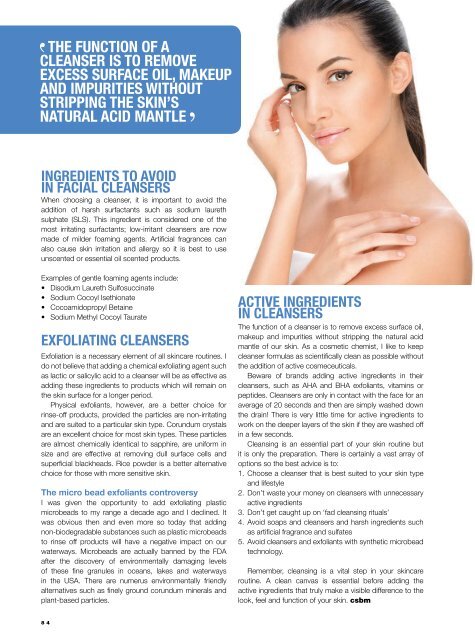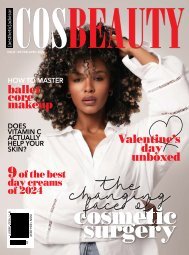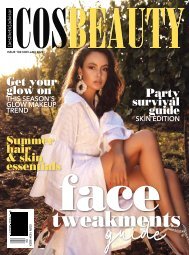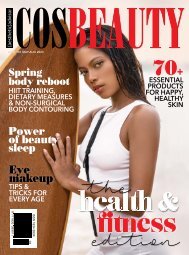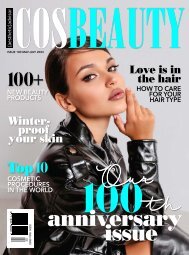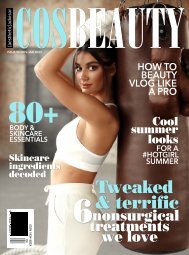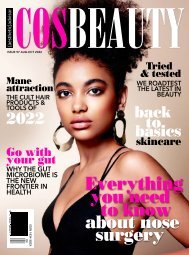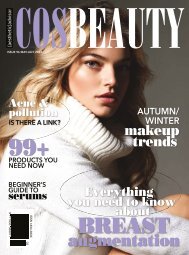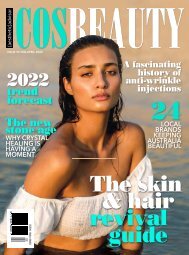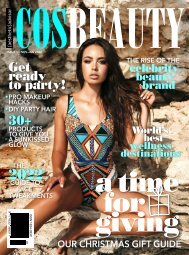Cosmetic Surgery & Beauty #72
Cosmetic Surgery and Beauty is the definitive consumer guide to aesthetic enhancement in Australia. Written by medical journalists and industry experts CSBM covers everything you need to know and with hundreds of untouched before and after photos it is the authoritative information source.
Cosmetic Surgery and Beauty is the definitive consumer guide to aesthetic enhancement in Australia. Written by medical journalists and industry experts CSBM covers everything you need to know and with hundreds of untouched before and after photos it is the authoritative information source.
Create successful ePaper yourself
Turn your PDF publications into a flip-book with our unique Google optimized e-Paper software.
skin<br />
the function of a<br />
cleanser is to remove<br />
excess surface oil, makeup<br />
and impurities without<br />
stripping the skin’s<br />
natural acid mantle<br />
Ingredients to avoid<br />
in facial cleansers<br />
When choosing a cleanser, it is important to avoid the<br />
addition of harsh surfactants such as sodium laureth<br />
sulphate (SLS). This ingredient is considered one of the<br />
most irritating surfactants; low-irritant cleansers are now<br />
made of milder foaming agents. Artificial fragrances can<br />
also cause skin irritation and allergy so it is best to use<br />
unscented or essential oil scented products.<br />
Examples of gentle foaming agents include:<br />
• Disodium Laureth Sulfosuccinate<br />
• Sodium Cocoyl Isethionate<br />
• Cocoamidopropyl Betaine<br />
• Sodium Methyl Cocoyl Taurate<br />
Exfoliating cleansers<br />
Exfoliation is a necessary element of all skincare routines. I<br />
do not believe that adding a chemical exfoliating agent such<br />
as lactic or salicylic acid to a cleanser will be as effective as<br />
adding these ingredients to products which will remain on<br />
the skin surface for a longer period.<br />
Physical exfoliants, however, are a better choice for<br />
rinse-off products, provided the particles are non-irritating<br />
and are suited to a particular skin type. Corundum crystals<br />
are an excellent choice for most skin types. These particles<br />
are almost chemically identical to sapphire, are uniform in<br />
size and are effective at removing dull surface cells and<br />
superficial blackheads. Rice powder is a better alternative<br />
choice for those with more sensitive skin.<br />
The micro bead exfoliants controversy<br />
I was given the opportunity to add exfoliating plastic<br />
microbeads to my range a decade ago and I declined. It<br />
was obvious then and even more so today that adding<br />
non-biodegradable substances such as plastic microbeads<br />
to rinse off products will have a negative impact on our<br />
waterways. Microbeads are actually banned by the FDA<br />
after the discovery of environmentally damaging levels<br />
of these fine granules in oceans, lakes and waterways<br />
in the USA. There are numerus environmentally friendly<br />
alternatives such as finely ground corundum minerals and<br />
plant-based particles.<br />
Active ingredients<br />
in cleansers<br />
The function of a cleanser is to remove excess surface oil,<br />
makeup and impurities without stripping the natural acid<br />
mantle of our skin. As a cosmetic chemist, I like to keep<br />
cleanser formulas as scientifically clean as possible without<br />
the addition of active cosmeceuticals.<br />
Beware of brands adding active ingredients in their<br />
cleansers, such as AHA and BHA exfoliants, vitamins or<br />
peptides. Cleansers are only in contact with the face for an<br />
average of 20 seconds and then are simply washed down<br />
the drain! There is very little time for active ingredients to<br />
work on the deeper layers of the skin if they are washed off<br />
in a few seconds.<br />
Cleansing is an essential part of your skin routine but<br />
it is only the preparation. There is certainly a vast array of<br />
options so the best advice is to:<br />
1. Choose a cleanser that is best suited to your skin type<br />
and lifestyle<br />
2. Don’t waste your money on cleansers with unnecessary<br />
active ingredients<br />
3. Don’t get caught up on ‘fad cleansing rituals’<br />
4. Avoid soaps and cleansers and harsh ingredients such<br />
as artificial fragrance and sulfates<br />
5. Avoid cleansers and exfoliants with synthetic microbead<br />
technology.<br />
Remember, cleansing is a vital step in your skincare<br />
routine. A clean canvas is essential before adding the<br />
active ingredients that truly make a visible difference to the<br />
look, feel and function of your skin. csbm<br />
84 www.cosbeauty.com.au


